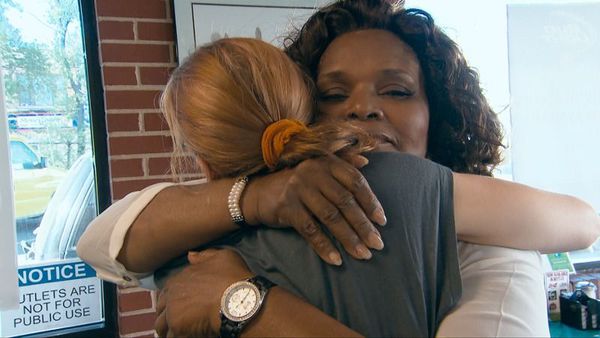Eye For Film >> Movies >> Dreamcatcher (2015) Film Review
Dreamcatcher
Reviewed by: Amber Wilkinson

Kim Longinotto's emotionally raw but surprisingly positive documentary is both an indictment on a society where slipping through the cracks into prostitution is all too easy and a celebration of one woman who makes it her business to stop that happening.
Brenda Myers-Powell is a power-house of energy. She is also the co-founder of the Dreamcatcher Foundation (with her colleague Stephanie Daniels-Michaels) and a former prostitute who, before she got off the street, was shot five times and stabbed a further 35. By day, she takes outreach classes in prisons, talking to prostitutes about ways to get them off the street and encouraging them to view themselves not as lawbreakers but as survivors of abuse. Somehow, she also finds time to take after-school groups with vulnerable teenagers in a bid to stop them getting on the game in the first place and, at night, she roams the streets in the Dreamcatcher van, handing out condoms, sympathy and a way out if anyone wants to take it.

In short, Myers-Powell is woman on a mission. Longinotto's camera doesn't shy away from the harsh realities of what she is trying to do. In one heartbreaking scene, girls in her after-school group, one by one, reveal they were abused - many under the age of 10. But Myers-Powell couples an open and understanding ear with a firm approach, stressing the girls' worth and trying to explain how though prostitution may look like an easy route out of their problems, it quickly descends into worse situations. Her 25-year stint on the street means she understands the lures as well as the dangers. As she puts it when describing her own decision to sell herself for sex, "she wanted to be shiny".
Longinotto's humanistic film is first and foremost about the individuals Myers-Powell meets, from pregnant working girl Marie, who has had enough of the life but is struggling to take the first step, to the schoolkid driven to try to make money to help her mum feed her siblings. Unusually for this type of documentary, there is also a consideration of what drives pimps to abuse the girls in the first place. Homer King - pimp alter ego Fancy - was an associate of Brenda's back in the day and now joins her in her classes to talk both about the methodology of pimping and how it can seem attractive to girls at first. Longinotto also takes an interest in his backstory and, in one quite shocking scene, we see him talking about the life in front of his parents.
This is not an overtly political film, focusing in on the situation the women find themselves in rather than on the society that has created the situation, but as the intergenerational nature of much of the abuse becomes apparent, it is likely to inspire many to want to do more to break the cycle.
Longinotto celebrates Myers-Powell but she doesn't shy away from the harder aspects of what she is doing. She may have a wig to die for for every day of the week, but we can see that sometimes it's hard for her to shoulder the mantle of caring for each of these girls as an individual and Longinotto also touches on the tragedies with the crusader's own family. We see her with her sister-in-law, whose little boy she looks after on a permanent basis, trying to persuade her to get out from under drugs and, quite possibly, Brenda's brother.
Unflinching but uplifting, Longinotto's film shows how even one person, if they put their minds to it, can make an enormous difference. The director, meanwhile, goes on to further cement her reputation for unsentimental but moving documentary work that looks to small stories in order to paint a bigger picture.
Reviewed on: 30 Jan 2015















